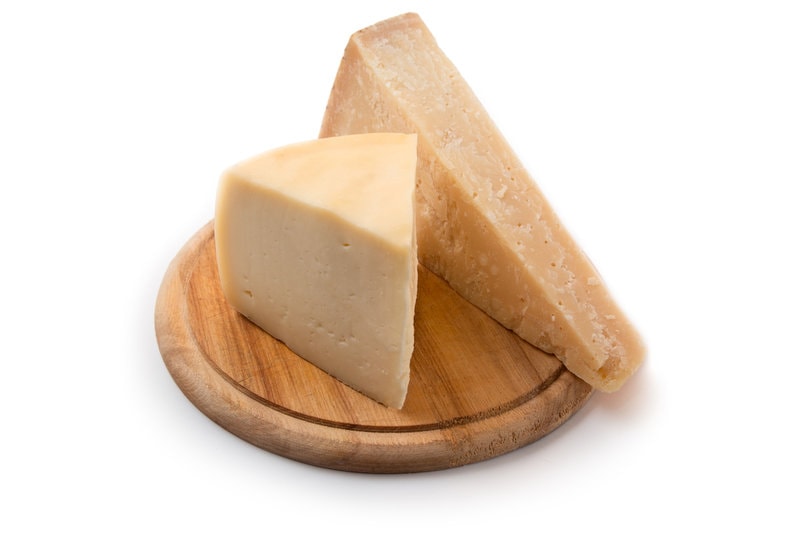Cheese often serves as a savory treat for both people and dogs. Dogs, as well as humans, are often drawn in by the tempting aroma of cheese. Cheeses contain beneficial nutritional content that is healthy for our canine companions. You’re likely already aware that there are many kinds of cheese, ranging from cottage cheese to blue cheese to cheddar, Swiss, Parmesan cheese, and many more. But can dogs eat cheese?
Yes, dogs can eat Parmesan cheese. It is safe for your canine friend to eat parmesan cheese, but it is best to only give it a small serving as an occasional treat. Parmesan cheese, or Parmigiano-Reggiano, originated in Italy. This hard, sharp cheese contains a lot of salt. Dogs should not overeat Parmesan cheese since too much salt isn’t healthy for dogs.
But some nutrients in Parmesan cheese make it a good occasional treat for your furry friend. Parmesan cheese contains calcium, dietary fiber, omega-3 fatty acids, potassium, and vitamins A, B-12, and K-2. As a dog owner, you may wonder what kind of cheeses are safe for dogs, what serving size is best for your particular pooch, and what cheeses to avoid to prevent health problems for your pup. We’ll cover all that and more in this article. First, let’s learn more about Parmesan cheese and potential problems from overconsumption.
What Happens If My Dog Eats Parmesan Cheese?

If you discover your dog ate a bit of Parmesan cheese, you can relax. Parmesan cheese is not toxic or dangerous for your four-legged friend.
However, since Parmesan cheese contains lactose and high sodium, avoid feeding them too much Parmesan cheese, especially if your dog is lactose intolerant.
Be on alert for signs of salt toxicity if you think your pooch ate a large amount of Parmesan. Salt toxicity signs include convulsions, muscle spasms, seizures, lethargy, fast heart rate, and diarrhea. Take your dog to a vet or visit an emergency pet clinic immediately if it displays these symptoms.
What Is Parmesan Cheese?
Parmesan cheese is from the Reggio Emilia and Parma provinces in Italy. Parmesan is a hard cheese with a shiny rind and a dry crunchy texture. Parmesan’s hard texture makes it one of the best low-lactose cheeses.
Parmesan cheese is made from pure cow milk without additives. The process of making this cheese ensures it is gluten-free and one of the purest kinds of cheese available.
As with all hard cheeses, Parmesan cheese is an aged cheese, so for preservation, it is high in sodium. When cheese production first began, salt was the only preservative, but we still use salt as a preservative in many foods today.
Parmesan cheese is durable, with a long aging period of at least 12 months and, in some cases, up to 40 months or more. Although not widely known, Parmesan cheese is a superfood packed with nutritional value.
Because dogs are sensitive to salt toxicity, avoid allowing dogs to eat too much Parmesan cheese. Canines can’t manage Parmesan cheese’s high salt content as humans do. Still, Parmesan cheese is a savory treat that your furry friend will likely enjoy.
Is Parmesan A Healthy Cheese?
Yes and no. While Parmesan is naturally healthy for dogs, its high sodium content means dogs should only eat small amounts. Parmesan cheese can help reduce certain health problems like kidney stones, arthritis, and gout.
Parmesan cheese contains the nutrients listed below:
- Calcium
- Dietary fiber
- Potassium
- Magnesium
- Omega-3 fatty acids
- Sodium
- Vitamins A, B-12, and K-2
But, dogs can experience adverse side effects from eating cheese. Dogs with lactose intolerance or dairy sensitivities should avoid eating Parmesan cheese. Even though Parmesan cheese contains relatively low amounts of lactose, if your dog doesn’t react well to lactose, avoid this snack.
Symptoms of lactose intolerance are as follows:
- Bloating
- Diarrhea
- Flatulence or gas
- A lack of appetite
- Vomiting
Another worry is that Parmesan cheese is very high in sodium. Too much salt can lead to salt poisoning for your furry friend, which is worse than lactose intolerance.
Symptoms of salt poisoning are as follows:
- Disorientation
- Diarrhea
- Excessive thirst
- Excessive urination
- Rapid heart rate
- High fever
- Lack of appetite
- Lethargy
- Vomiting
- Weakness
Severe cases of salt poisoning can lead to muscle spasms, convulsions, and seizures. Seek immediate treatment from a vet if your dog exhibits such symptoms. Severe cases can lead to a coma and even death for your fur buddy.
Lactose-Intolerant Dogs

All dogs are lactose-intolerant to a degree. This is because of dogs’ deficiency in lactose production. Lactase is an enzyme that aids the breakdown of milk sugar, lactose, in the digestive tract. Dog milk often contains 3% lactose, while cow milk has 5%.
Pooches’ lactase production decreases immediately after puppyhood. This makes it more difficult for dogs to digest lactose. This means that you should not feed milk and dairy products to your canine companion. Even puppies do not have enough lactase to break down cow milk.
Some breeds are more lactose-intolerant than others. Intolerance levels vary depending on the dog, its breed, and its age. But since Parmesan cheese is very low in lactose, it can be a good supplement for protein and other vitamins.
When feeding milk, cheese, or other dairy products to your dog, only serve dairy products as an occasional treat. It is also better not to serve the cheese on its own. Serve your dog Parmesan cheese by adding it to their dog food. This can aid digestion and build lactose tolerance in dogs’ gastrointestinal tract.
However, too much dairy can cause the following problems for dogs:
- Bloating
- A lack of appetite
- Vomiting and weakness
- Flatulence
- Diarrhea
- Dehydration
- Lethargy
Dogs Suffering From Kidney Issues
Dogs with kidney issues should not eat any Parmesan cheese. The kidney serves several purposes in the mammalian body. One function is filtering waste and toxins from the blood.
Another kidney function is producing hormones and enzymes. Kidneys also maintain electrolytes and the pH balance in the blood.
Canine kidney disease occurs when dogs’ kidneys lose the ability to filter waste from the body. This eventually leads to renal failure, accumulation of toxins, and eventual death. There are two types of kidney failure.
The first is Acute Renal Failure, which is a sudden episode of kidney failure or damage. The second is Chronic Kidney Disease (CKD), also known as chronic kidney failure, which develops and worsens over time. CKD will lead to the eventual death of the dog.
Symptoms of kidney failure in dogs are listed below:
- Loss of appetite
- Nausea
- Diarrhea
- Vomiting
- Depression
- Lethargy
- Dehydration
- Increased thirst
- Increased urination
- Weight loss
- High blood pressure
- Gastric ulcers
Dogs Suffering From Heart Issues
Dogs with heart issues should not eat Parmesan cheese. Any type of disease that affects the heart is referred to as “heart disease.” The heart is vital for the proper functioning of the body’s other organs because it distributes oxygenated blood throughout the body.
The body needs blood to function, and when the heart is sick, most parts of the body become sick because of not receiving oxygen properly. Research shows that 10% of dogs diagnosed by vets have some form of heart disease.
The early stages of heart disease can go unnoticed by many dog owners. So, take your canine companion to your veterinarian for checkups often.
Some early symptoms of heart disease in dogs are listed below:
- Coughing
- Fatigue
- Lethargy
- Shortness of breath
- Sudden collapse
Can Dogs Have A Little Bit Of Parmesan Cheese?

Yes, most dogs can have a little bit of Parmesan cheese without negative side effects. You can use Parmesan cheese to treat your pooch during training by giving it as a reward. It can also be used to entice your fur baby to eat or take medications.
However, you cannot feed Parmesan cheese to your canine every day. Dogs should only eat Parmesan cheese once in a while because of its high salt content.
Too much Parmesan cheese, or any high-sodium food, can put your dog at risk for salt poisoning.
Is It OK To Sprinkle Parmesan Cheese On My Dog’s Food?
Europeans classify Parmesan Cheese as a functional food, food packed with medicinal benefits. The cheese is nearly lactose-free, so it is more beneficial to your pooch’s GI system than other cheeses.
Larger breeds, like the Great Dane, can have 1 and ½ teaspoons up to 1 tablespoon. But smaller breeds like the Chihuahua should only have ½ teaspoon.
Considering your dog’s health conditions is important. A canine with heart or kidney problems should not be allowed to eat cheese. Also, consider your dog’s lactose tolerance. Consult a vet before adding new items to your dog’s diet.
How Much Parmesan Cheese Is OK For Dogs?
How much Parmesan cheese dogs can safely eat depends on their size, breed, and health conditions. If your canine has never tried cheese before, offer only a little at first. An average, healthy dog is recommended to have up to 1 teaspoon of Parmesan cheese.
Parmesan cheese is high in calcium, which helps counteract osteoporosis, and phosphorus, which is essential for bone development. But that’s not all. Parmesan cheese is even good for your dog’s oral health, preventing tartar buildup that results in plaque under their gum lines.
What Kind Of Cheese Is Good For Dogs?
Most cheeses are ideal to be used as an occasional treat for dogs. Cheese provides essential vitamins, minerals, probiotics, and other macronutrients. But some cheeses are better for dogs than others because certain cheeses contain additives that are unhealthy for pooches.
Listed below are the kinds of cheeses we consider good for your furry companions:
Cheddar Cheese
Like Parmesan cheese, cheddar cheese is an older cheese. Cheddar is rich in nutrients like protein, calcium, vitamin A, and phosphorus. It’s also a good source of riboflavin, niacin, and thiamine.
Like every other cheese, cheddar cheese contains lactose, which can cause indigestion in dogs. Although Parmesan cheese is lower in lactose, cheddar is also a very good option for canines.
Swiss Cheese
Swiss cheese, like Parmesan, is low in lactose, which makes it one of the best cheeses for dogs. Unlike Parmesan cheese, which is high in sodium, Swiss cheese is also low in sodium. This makes it a healthy choice for pooches.
Swiss cheese is a good source of protein and calcium. It also contains vitamins A and B and other minerals. However, Swiss cheese is high in fat, so too much can negatively affect your dog’s health.
Cottage Cheese
Cottage cheese is an excellent source of protein and is often recommended when your four-legged friend needs a bland diet. This cheese can also serve as a good replacement for meat.
Cottage cheese is low in lactose and can help regulate blood sugar, boost the immune system, and maintain heart health. But, like Parmesan cheese, cottage cheese is also high in sodium.
Parmesan Cheese

“Parmigiano Reggiano” is from Italy’s Parma district. It is made naturally from pure cow milk without additives. This natural cheese is one of the most suitable kinds of cheese to give dogs.
Parmesan cheese is high in calcium, protein, essential amino acids, and probiotic agents, along with other vitamins and minerals. Your canine friend can eat Parmesan without qualms, but in small amounts because of its high salt content.
Mozzarella Cheese
Mozzarella cheese contains a small amount of lactose but has a higher fat content than Parmesan and most other cheeses. Though mozzarella cheese contains less protein than natural Parmesan cheese, mozzarella cheese is easier for dogs to eat because it is often sold and packaged pre-shredded.
What Cheeses Can Dogs Not Eat?
Dogs cannot eat cheeses that are high in lactose, sodium, or fat. Doggies also can’t eat cheese with additives, such as spices, herbs, and preservatives.
Blue Cheese
Blue cheese, unlike Parmesan cheese, is very high in lactose, which can negatively affect your dog’s health. Blue cheese contains a fungus that can produce roquefortine C, which is very detrimental to dogs’ health.
Roquefortine C can cause vomiting, diarrhea, and seizures in your four-legged buddy. So, while dogs can eat Parmesan cheese, blue cheese is unhealthy and even dangerous for pooches.
Soft Goat Cheese

Goat cheeses are high in sodium and fat. While too much sodium can lead to salt toxicity, too much fat can lead to canine obesity. Avoid giving dogs goat cheese.
Additionally, goat cheeses often include additives such as herbs and spices. These additives are potentially dangerous to your canine companion. Goat cheese is also higher in lactose compared to Parmesan cheese.
Feta Cheese
Like goat cheese, Feta cheese is high in sodium and fat. Feta is an aged cheese like Parmesan, but Parmesan is a better choice to feed your furry friend. Feta’s fat content is high and can quickly cause your four-footed friend to develop pancreatitis and obesity. So avoid giving Feta cheese to your dog.
Brie
Brie cheese is a farmhouse cheese from France. Brie is a rich, buttery, and fruity cheese that is not good for dogs. Although it is low in lactose, Brie cheese, unlike Parmesan cheese, is high in saturated fat.
Eating too much fat can make your canine friend sick, so do not feed brie cheese to your dogs. It also contains a mold that helps it achieve its marble-like look. This mold can also be lethal to your canine companion.





